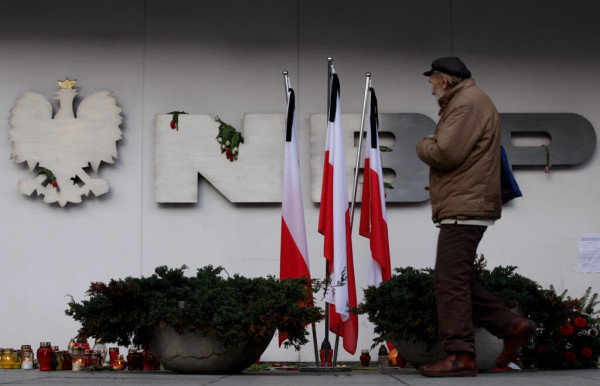Politics will decide ouster of Polish central banker, even harshest critics admit
WARSAW — The future of beleaguered National Bank of Poland chief Adam Glapiński will be decided by the the country’s ruling majority in a political decision rather than based on the accusations he faces, a number of critics say.
Glapiński’s performance since 2016 at the helm of the NBP is set to undergo scrutiny following the formal presentation on Tuesday to parliament of a motion to put him on trial before the State Tribunal, a special court for Poland’s top officials.
However, the parliamentary committee for constitutional responsibility, which will vote on the motion, is yet to schedule a date for its next meeting.
The motion, which is backed by 191 MPs from the ruling coalition, lists eight charges against Glapiński which boil down to the governor's having acted in concert with the former right-wing Law and Justice (PiS) government during his term. Such actions allegedly violated the independence of the central bank.
Yet even some of Glapiński's harshest critics, among them Przemysław Litwiniuk, a member of the NBP’s Monetary Policy Board, are reluctant to call the case against the PiS appointee a slam-dunk.
“The State Tribunal is a court set up [by] politicians to try politicians. It has little to do with an actual court of law and it will all ultimately be down to a political vote in the parliament whether Glapiński faces suspension and trial or not,” Litwiniuk told POLITICO.
“But the most important outcome will be that we’re going to finally see a proper examination of Governor Glapiński’s actions.”
The charges range from buying Treasury bonds to finance the government’s emergency spending during the Covid-19 pandemic, to slashing interest rates by 1 percentage point ahead of last year's election, as well as speaking highly of the PiS government while criticizing then-opposition leader and current PM Donald Tusk.
Litwiniuk, however, appeared to endorse the wider sentiment behind the charges.
“Poland had better NBP governors in the past. People who respected their independence of politics and who wouldn’t let the NBP get entangled with politics,” he said.
Rhetoric alone is unlikely to see Glapiński suspended or ousted from the central bank, critics agree. Nor is it likely to change the European Central Bank's legal opinion that the measures, if deemed unlawful, risk impeding the NBP's independence and, by extension, the independence of the ECB's General Council.

“It’s a very generic thing to say that Glapiński committed ‘grave violations’ in light of the Statute of the European System of Central Banks and of the European Central Bank,” Patryk Wachowiec, a legal analyst for the Civil Development Forum, a Polish economic think tank, told POLITICO.
“It’s quite certain that some of the charges are not weighty enough to merit removing [Glapiński] from office.”
In the next phase of proceedings, MPs will assess the charges against Glapiński in the context of a special parliamentary committee. The process will culminate in a plenary vote on whether the NBP president should appear before the State Tribunal.
If the plenary votes in favor of the motions, Glapiński will be suspended from active duty even though his official term doesn't end before 2028. He will not lose his right to appeal the suspension in the Court of Justice of the EU.
A suspension would see his duties passed to deputy head Marta Kightley.
Olive branch?
In defending his position, Glapiński has long said his extraordinary actions during the Covid-19 pandemic were justified by the country's state of emergency. Meanwhile, inflation — which peaked at 18.4 percent February 2023 — fell back to 2.8 percent last month, vindicating the NBP’s monetary policy in the contentious pre-election period last October, Glapiński argued.
“I understand that, for Tusk, the easiest way to manage the campaign was to accuse the government and the central bank of causing inflation, because it was so high,” Glapiński told the Financial Times in an interview published Monday. He described some of the charges as “idiotic” and claimed they had changed many times.
But the central bank chief also extended an olive branch to Tusk, who had made removing Glapiński from the NBP a central campaign pledge.
“We are now after the elections. It is time to stop. We have common problems,” Glapiński said.
Fellow rate-setter Litiwniuk, however, was pleased that Glapiński's more opaque practices were receiving greater scrutiny as a result of the charges.
“Under the guise of misinterpreted independence, the NBP has effectively shut off any possibility to examine its policy decisions and their legality,” Litwiniuk told POLITICO, adding the trial would at least offer "an opportunity to bring back the transparency of the NBP.”
Litwiniuk said Glapiński's decision to block access to NBP records had impeded efforts to assess how pandemic asset purchases during the pandemic had been carried out.
“I’ve received nothing,” he said, noting “the information was key to establishing if the NBP carried out asset purchases outside the market or not.”
According to the MPs’ motion, the asset purchase violated the Polish constitution, which bans the NBP from financing the government deficit.
Glapiński now awaits a decision by the parliamentary committee for constitutional responsibility about when it will next meet.